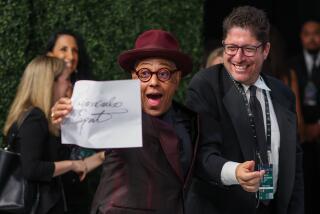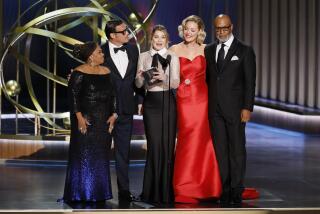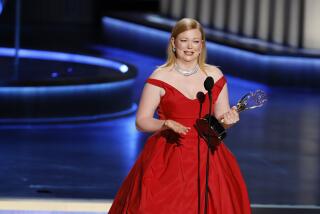All great TV episodes have a key scene at their heart — especially the Emmy nominees
Whether you’ve got eight, 13 or 24 episodes in the can, boiling an entire season of a television show down to one critical, hopefully award-winning moment might seem unfair. But in some cases, that’s all it takes: One well-executed interaction or particularly poignant scene can be the final reason why an Emmy voter tips your way. Writers from this year’s comedy and drama nominees all had unique takes on what might be their statue-worthy scene and 10 of the 12 shared their thoughts with The Envelope. If you’re saving these episodes for future viewing (and why on Earth would you do that?), you might want to skip reading this article.
Warning: Several of these videos contain profanity.
DRAMAS
“The Americans”
“Start,” written by Joe Weisberg and Joel Fields
Key scene: As the Jennings family tries to return to the Soviet Union, FBI agent and neighbor Stan (Noah Emmerich) confronts them, and although he’s personally crushed that they’ve lied to him for years, he lets them go.
Importance: “‘The Americans’ has been building to this scene for six years,” Weisberg and Fields say in an email. “Stan was always going to figure out the truth one day and confront Philip [Matthew Rhys] and Elizabeth [Keri Russell]. While the crimes and personal betrayals easily could have led to bloodshed … Stan’s fundamental decency meant there was the potential for a different kind of ending. … It was a fine line to walk, and the entire series rested on them pulling it off.”
“The Crown”
“Mystery Man,” written by Peter Morgan
Key scene: Having tracked his wife (Claire Foy as Queen Elizabeth II) down to a remote hunting lodge, Prince Philip (Matt Smith) comes to terms with how much he — as well as she — have given up to serve the Crown, and bends the knee before her.
Importance: “‘The Crown’ is, at its heart, a show about the choices we all face between sacrificing ourselves to a higher ideal on one hand and feeding our impulses,” Morgan says via email. “This is one of those era-defining arguments in a relationship. Incredibly highly charged… If it goes wrong, it can be the end of any kindness and love in the marriage … when it goes right, it can set the tone for decades to come. The stakes are so high at the start of the scene that we feel it could go either way.”
“The Handmaid’s Tale”
“June,” written by Bruce Miller
Key scene: After Offred/June (Elisabeth Moss) is revealed to be pregnant, Aunt Lydia (Ann Dowd) serves her soup, but June refuses to eat out of protest.
Importance: “So much of the show is about how women are used by the patriarchy to enforce misogynistic rules in Gilead,” says Miller. “So, to see a power scene between two women in this society ruled by men proves there is a power dynamic still between women. June is protected physically, but there are other ways they can exact power against her, and she has to learn how to balance those two things.”
“Killing Eve”
“Nice Face,” written by Phoebe Waller-Bridge
Key scene: Investigator Eve (Sandra Oh) and assassin Villanelle (Jodie Comer) meet for the first time in a hospital bathroom, but neither know who the other is yet, or how involved they will soon become in one another’s lives.
Importance: “You could say the key scene is the moment when Villanelle and Eve finally meet … and Villanelle suggests Eve wear her hair down,” says executive producer Sally Woodward Gentle, and lead writer-executive producer Waller-Bridge concurs. “Ladies’ bathrooms are usually considered safe havens for women,” she says. “[They] are momentarily off their guard in there, which allows them to notice each other as women rather than assassin and agent. It’s intimate, quiet and sensual and leads us into one of the most violent scenes in the show.”
WATCH: Video Q&A’s from this season’s hottest contenders »
“Stranger Things”
“Chapter Nine: The Gate,” written by the Duffer Brothers
Key scene: Dustin (Gaten Matarazzo) is searching for a dance partner at the Snowball Dance and is rescued from embarrassment and his own lack of confidence by Nancy (Natalia Dyer), who gives him a pep talk.
Importance: “It defines the show for us, because Dustin is a kid who has helped save the world — but at the end of the day, he’s still struggling to navigate middle school,” says Ross Duffer. Adds Matt Duffer, “We also love how [the actors] played it, shifting from crushing disappointment to finding a bit of confidence — it’s subtle and powerful, and sincere. The series has so much visual effects and action, this helps ground it and make it personal.”
COMEDY
“Atlanta”
“Barbershop,” written by Stefani Robinson

Brian Tyree Henry and Robert Powell in a scene from FX’s “Atlanta.” Warning: This video contains profanity.
Key scene: Alfred/Paper Boi (Brian Tyree Henry) is waiting at a barbershop to get a haircut and his barber Bibby (Robert Powell) enters in a whirlwind.
Importance: “It’s a great introduction for Bibby,” says Robinson. “He only exists in this episode, so we really jump into the deep end with this guy. He did a great job at establishing the dynamic that follows the story for the rest of the episode — the frustration that Al feels while he’s at the mercy of this psychopath, and it’s great to establish the head space they’re going to be in for the rest of the episode.”
“Barry”
“Chapter One: Make Your Mark,” written by Alec Berg and Bill Hader

Bill Hader and Henry Winkler in a scene from HBO’s “Barry.”
Key scene: Barry (Hader) delivers a monologue to Gene Cousineau (Henry Winkler) in a theater parking lot.
Importance: “It’s the turning point in the trajectory of the entire series,” Berg writes in an email. “Cousineau tells him he’s not a good actor, because he didn’t reveal any truth. Barry then essentially admits to leading an incredibly unhappy life as a murderer, which Gene mistakes for a monologue. We as the audience see the truth in Barry’s heart, and Gene finds him to be a passable actor … and allows Barry to join the class, which plants the seed for the series’ entire premise.”
“Barry”
“Chapter Seven: Loud, Fast, and Keep Going,” written by Liz Sarnoff

Bill Hader and Chris Marquette in a scene from HBO’s “Barry.”
Key scene: Barry (Hader) and Chris (Chris Marquette) face off at gunpoint, and it becomes clear that Chris has to be done away with.
Importance: “It was obvious that we were going to have to kill this guy Chris, and it was scary, because he’s a stand-up guy, like he was the Good Barry,” says Sarnoff. “We tried to demonstrate in real time that Barry doesn’t have a choice, and he’ll lose everything if he doesn’t kill this guy — and it was a no-turning-back moment for the viewer. It broke Barry open for us on an emotional level.”
“The Marvelous Mrs. Maisel”
“Pilot,” written by Amy Sherman-Palladino

Rachel Brosnahan in a scene from Amazon Studios’ “‘Marvelous Mrs. Maisel.”
Key scene: Having just watched her husband walk out on her, Midge (Rachel Brosnahan) gets drunk and heads downtown to do her first, impromptu stand-up performance.
Importance: “It was a monster scene, because my girl — Rachel — is not a stand-up,” says Sherman-Palladino, “she’s an actress, and this is a key pivotal moment, when Midge stumbles on her superpower she didn’t know was there, this outlet for anger and pain through comedy that she had no idea was inside of her. The challenge was that scene had to be completely legitimate. You had to believe she could be a stand-up comic.” Adds show co-creator Dan Palladino, “She found a voice she didn’t even know she was looking for, and that’s what interested us.”
“Silicon Valley”
“Fifty-One Percent,” written by Al Berg

Thomas Middleditch and Matt Ross in a scene from HBO’s “Silicon Valley.”
Key scene: Richard (Thomas Middleditch) tricks Gavin (Matt Ross) into thinking he’s willing to give Pied Piper solely to him to operate rather than see it killed off by Laurie (Suzanne Cryer) and Yao (Tzi Ma), whom Gavin has teamed up with to make their knock-off rival the dominant platform. Richard’s impassioned offer is a stall tactic while he pulls in enough users to keep control of Pied Piper and leave Gavin out in the cold.
Importance: “There were a lot of moving parts,” Berg writes in an email. “Richard had to convince Gavin and the audience that he would rather give away Pied Piper than see it killed. We as the audience needed to believe this was genuine, so Thomas Middleditch had to deliver a speech in a way that was emotional and convincing. In the end, there had to be a funny and satisfying reveal that it was all a ruse, right at the emotional climax of the episode.”
More to Read
From the Oscars to the Emmys.
Get the Envelope newsletter for exclusive awards season coverage, behind-the-scenes stories from the Envelope podcast and columnist Glenn Whipp’s must-read analysis.
You may occasionally receive promotional content from the Los Angeles Times.






